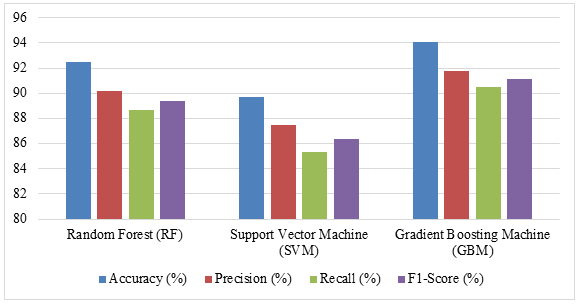Predictive SLA Management: Leveraging Machine Learning to Improve Upstream Feed Reliability
DOI:
https://doi.org/10.5281/zenodo.17103533Keywords:
predictive sla management, machine learning, upstream feed reliability, gradient boosting machine, operational efficiency, downtime reductionAbstract
In order to improve the reliability of upstream feeds, this study investigates the use of machine learning approaches for the management of anticipatory Service Level Agreements (SLAs). Random Forest, Support Vector Machine, and Gradient Boosting Machine (GBM) were the three models that were constructed and assessed with the help of historical service level agreement (SLA) and operational data. The GBM model displayed exceptional performance, with an accuracy of 94.1%, which enabled it to accurately predict service level agreement (SLA) breaches and carry out proactive interventions. After using predictive service level agreement management, there was a considerable decrease in the number of feed disruptions (26.7%), the average duration of interruptions (34.2%), and the total amount of downtime (51.8%). In addition, the operations team provided qualitative input that emphasized improvements in maintenance planning, a reduction in the number of emergency interventions, and an increase in the level of satisfaction with feed reliability. These findings provide further evidence that incorporating machine learning-driven predictive analytics into service level agreement management (SLA) management improves operational efficiency, decreases downtime, and strengthens decision-making capability in upstream feed operations.
Downloads
References
F. Z. Bassine, T. E. Epule, A. Kechchour, & A. Chehbouni. (2023). Recent applications of machine learning, remote sensing, and IoT approaches in yield prediction: A critical review. arXiv preprint arXiv:2306.04566.
J. Y. Caruana. (2024). Data-driven decision making to improve operational efficiencies in leakage control operations. M.S. Thesis, University of Malta, Malta.
A. K. Kalusivalingam, A. Sharma, N. Patel, & V. Singh. (2022). Leveraging reinforcement learning and predictive analytics for continuous improvement in smart manufacturing. International Journal of AI and ML, 3(9).
X. Liang, Q. Wang, A. Al-Tahmeesschi, S. B. Chetty, D. Grace, & H. Ahmadi. (2024). Energy consumption of machine learning enhanced open RAN: A comprehensive review. IEEE Access, 12, 81889–81910.
S. E. E. Næss. (2023). Potential of machine learning in demand forecasting based on point of sales data for food producers. M.S. Thesis, Norwegian University of Science and Technology (NTNU), Trondheim, Norway.
E. O. Nwulu, T. Y. Elete, O. V. Erhueh, O. A. Akano, & K. O. Omomo. (2024). Leveraging predictive modelling to enhance equipment reliability: A generic approach for the oil and gas industry. International Journal of Engineering Research and Development, 20(11), 951–969.
C. Puligheddu. (2022). Machine learning-powered management architectures for edge services in 5G networks.
G. K. Sinha. (2022). Leveraging data analytics in multimodal deep learning for predictive maintenance aimed at minimizing rig downtime. Journal of Artificial Intelligence & Cloud Computing, 1(279), 2–10. doi:10.47363/JAICC/2022
D. Tsolakidis, L. P. Gymnopoulos, & K. Dimitropoulos. (2024). Artificial intelligence and machine learning technologies for personalized nutrition: A review. Informatics, 11(3), 62.
G. K. Walia, M. Kumar, & S. S. Gill. (2023). AI-empowered fog/edge resource management for IoT applications: A comprehensive review, research challenges, and future perspectives. IEEE Communications Surveys & Tutorials, 26(1), 619–669.

Published
How to Cite
Issue
Section
ARK
License
Copyright (c) 2025 Pathik Bavadiya

This work is licensed under a Creative Commons Attribution 4.0 International License.
Research Articles in 'Applied Science and Engineering Journal for Advanced Research' are Open Access articles published under the Creative Commons CC BY License Creative Commons Attribution 4.0 International License http://creativecommons.org/licenses/by/4.0/. This license allows you to share – copy and redistribute the material in any medium or format. Adapt – remix, transform, and build upon the material for any purpose, even commercially.










